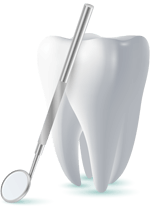Frequently Asked Questions
Why do I need to have a crown?
Dental crowns are required and recommended for many reasons:
- For the protection of a weaker tooth (for example, a tooth that had a root canal treatment is weaker than normal and therefore it has a higher probability to fracture)
- For the protection of a tooth with a large filling/ restoration ie the tooth has more filling than actual tooth.
- To cover/ put on top of an implant fixture
- To provide attachment support for a bridge
- To change the colour, shape of a tooth for aesthetic reasons
In order to preserve and provide protection to the tooth and maximises its life span, it is important that a crown is fitted with no delay. There is no guarantee how long a tooth may be able to avoid fracturing; especially if it does not have enough protection to withstand the constant work of chewing from day to day. And, if the tooth does fracture, it is possible that more dental treatment may be required or the tooth may be lost.
Why do I need to see the dentist regularly?
Teeth play several important roles. They are to:
- Chew your food
- Support your lips and cheeks. (think of grandma/pa who have lost their teeth and when they take their dentures/ teeth out, their cheeks and lips fall inwards.)
- Help with speech (remember when you lost your front tooth and you lisped/ whistled)
- Lights up your face when you smile
So, it is easy to see why we should keep your teeth for life. Seeing a dentist regularly makes sure that your teeth and supporting structures are healthy and any small areas of concern may be addressed before they become BIG problems.
Dental care can be seen like servicing your car. People invest a lot of money in their car and it gets serviced every six months. Some people change cars every 10 to 15 years. With your teeth, you only get one set in your adult years, so they need to last you a lifetime. In order to make sure you keep them for a lifetime, servicing them every 6 months is required, like your car.
Do I need to see a specialist? Why can’t I just see you guys?
In order for you to receive the best care possible for your dental health, we may need to recommend you to see a specialist. For example, if an extraction is required for a tooth with multiple roots pointing in all directions; we will refer to an oral surgeon who specialises in these kinds of cases on a daily basis. That way we do not battle with it for hours and keeping you in the chair and, therefore less stress involved.
There are 12 specialities in dentistry:
- Orthodontics: braces
- Endodontics: root canal treatment and trauma
- Periodontics: gum specialists / implants
- Prosthodontics: dealing with major reconstruction of bites / implants
- Paediatric: treating children
- Special needs dentistry: treating patients with special needs.
- Oral and Maxillary Facial Surgeon: major reconstruction of head and neck and difficult extractions
- Oral Medicine: treating patients with abnormal lumps/ bumps, colours or soreness in the mouth
- Oral Pathology: diagnosing and researching oral diseases; usually this specialty ties in with oral medicine.
- Forensic Dentistry: Helping to identify people when all other means (fingerprints, facial recognition) are not possible.
- Public Health Dentistry
- Oral Surgery: dealing with mouth and upper and lower jaw issues including difficult extractions.
Is it going to hurt?
Patient comfort is highly valued at our clinic. We understand the stress that dental visits can bring. Most treatments are carried out under local anaesthetics to prevent any discomfort during treatment. For those who are concerned about receiving local anaesthetic, we also provide Penthrox (what footballers use when they injure themselves on the field during a game) Valium or Nitrous Oxide (laughing gas currently available) to help you relax. That way, your dental visits here are as comfortable and relaxed as possible for your needs.
Why not take the tooth out?
Extraction of the tooth is our last option. Whilst it may be the simplest thing at the time, the cost for replacement may be far greater than it is to save the tooth. Also consider, once you have the tooth removed, how are you going to chew or how is it going to affect your smile and appearance.
Think of the tooth as being anchored by its root(s) into your jaw. Most replacements of teeth are sitting on top of the gums; the only thing that represents a tooth being replaced in its entirety is an implant. The implant is the root, and the crown is the tooth like structure on top of it.
Once the dentist has assessed the situation, he will advise what the best course of treatment is. It may be that an extraction is required. But it is the last option.
How much is it going to cost?
Quotes are not provided over the phone or over the counter, unless it has been assessed, diagnosed and treatment planned by one of our dentists prior. This involves a consultation, diagnostic testing including any imaging to help identify the dental issue. Based on the findings, suitable treatment options and fees can be presented.

